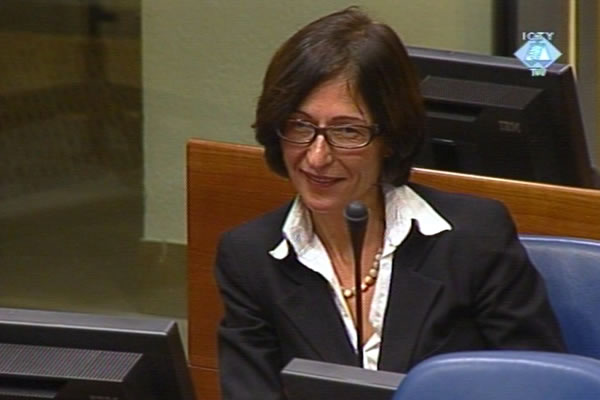Home
FLORENCE HARTMANN REQUESTS STATEMENTS OF PROSECUTION WITNESSES
Alleging that the behavior of the special amicus curiae prosecutor is contrary to the basic legal documents and Tribunal’s jurisprudence, Florence Hartmann’s defense has demanded that he be ordered to disclose the statements of witnesses who will give evidence at the contempt of court trial on 5 and 6 February 2009
 Florence Hartmann in the courtroom
Florence Hartmann in the courtroom Two weeks before the scheduled beginning of the trial of French journalist Florence Hartmann, Canadian lawyer Bruce MacFarlane, special amicus curiae prosecutor in her case, failed to disclose to the defense any of the statements given by witnesses he intends to call. The defense, therefore, filed an ‘urgent motion’ demanding that the prosecutor be ordered to ‘immediately obtain detailed statements” from the witnesses he intends to call’ and “disclose them without further delay” to the defense. As the defense put it in its motion, the fairness of the trial would be compromised if the defense did not know what the witnesses would say; the defense would then be unable to prepare its case and rebut their evidence.
The French journalist and former OTP spokesperson faces contempt of court charges for disclosing information on the confidential decisions of the Appeals Chamber in the Milosevic case. The trial is scheduled for 5 and 6 February 2009.
In his letter sent to the defense recently, the special prosecutor has argued that the by the Rules of Procedure and Evidence ‘he is not required to take or disclose” witness statements’. The defense considers this attitude to be directly opposed to both the Statute and the Rules of Evidence and Procedure – as well as to the Tribunal’s jurisprudence and the conclusions of the Appeals Chamber. According to the defense, the refusal to disclose evidence violates the right of the accused to a prompt and detailed notice of the prosecution case and her right to be able to confront the evidence of the prosecution. In other words, the French journalist cannot be denied the basic rights that every accused before the Tribunal has simply because she is not charged with war crimes but ‘only’ with contempt of court.
Among the witnesses on the list of the special amicus curiae prosecutor are Gavin Ruxton, chief of the Trials Division of the Office of the Prosecutor, Robyn Vincent, registrar of the Special Court for Lebanon, Evelyn Anoy, legal coordinator in the Tribunal’s Registry and Yorric Kermarrec, the register in the publishing house that published the book Peace and Punishment written by Florence Hartmann.
The defense announced it would call five witnesses. The first is Natasa Kandic, director of the Humanitarian Law Center; she will give evidence on the importance of international justice for victims. Among the defense witnesses are Louis Joinet, a former rapporteur of the UN commission for the Former Yugoslavia, and Nura Alispahic from the Mothers of Srebrenica association. The defense intends to examine the special prosecutor MacFarlane himself and reserves the right to call the accused Florence Hartmann.
The Trial Chamber has yet to deliver its decision on the motion the defense filed alleging abuses committed by the special prosecutor and asking the Chamber to ‘review’ the Florence Hartmann case. Her defense counsels Karim Khan and Gueanel Mettraux in particular accuse MacFarlane of misleading the judges when he failed to inform them that all the controversial information disclosed by Florence Hartmann had already been in the public domain and had been made public in Tribunal’s own documents. Thus, the French journalist ended up being accused of having published ‘something everybody already knew’.
Linked Reports
- Case : Contempt
- 2009-01-12 HARTMANN URGES JUDGES TO ‘RECONSIDER’ HER CASE
- 2008-12-19 FLORENCE HARTMANN HAS NEW DEFENSE COUNSEL
- 2008-12-01 FLORENCE HARTMANN TRIAL SET TO START
- 2009-01-26 MOTION TO STAY PROCEEDINGS AGAINST FLORENCE HARTMANN
- 2009-01-30 FLORENCE HARTMANN’S DEFENSE WILL CALL FOR DISQUALIFICATION OF JUDGES
- 2009-02-10 AVALANCHE OF MOTIONS BY HARTMANN’S DEFENSE
